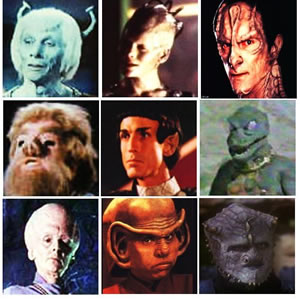On the fifth day he realized his only hope of escape was to amputate his own arm
The human body is a marvel of perfectly synchronized chemical reactions choreographed to perform optimally in a relatively narrow range of external conditions. While it is possible for the human organism to adapt to environmental stresses, it doesn’t take much for its symphony of physiology to collapse into chaotic discord. When deprived of water, food, or oxygen these processes begin to break down. If internal body temperature varies by more than four degrees, malfunction is imminent. Despite this fragility, when put to the test the body can prove to be extraordinarily resilient. […]
[Read more →]
Tags: Essays · Nonfiction · Canibalism · Survival

A frequent criticism of the popular television series Star Trek: The Next Generation centered around the unremarkable physical appearance of its various alien species. In nearly every episode, the crew of the starship Enterprise would encounter a “new” civilization– a society of life-forms that had supposedly developed in complete isolation from other worlds. Amazingly, the overwhelming majority of these aliens barely differed in appearance from humans, typically distinguished by a small wrinkle on their forehead or nose. This absurdity prompted a critic on Trek’s own website to dub them “Forehead Aliens of the Week.” Even more preposterous than their physical similarity to humans, however, was the utter lack of divergent philosophies and sociopolitical ideals exhibited by these “aliens.”
[Read more →]
Tags: Essays · Cultural Diversity
The Adverse Effects of the Free Market

When Thomas Jefferson determined the “pursuit of happiness” to be one of humankind’s unalienable rights, he could not have foreseen the consequences of dangling this elusive proverbial carrot under the noses of subsequent generations. For the average proponent of free market economics, and by extension the average consumer, this phrase is synonymous with the accumulation of capital. If this notion were rooted in truth, one would expect the beneficiaries of the most successful marketplace in history – the American middle-class – to be living in a veritable state of pure ecstasy.
[Read more →]
Tags: Essays · Addiction · Depression · Mental Illness · Society
Getting to Know the Beehive Collective
Insects such as locusts or wasps are morphed with modern military apparatus, while blood-sucking mosquitoes represent corporations drilling for oil.
Mural painting, or public art, is one of the oldest and most important forms of artistic, political, and social expression. From prehistoric cave paintings to the frescos of ancient Greece, humanity has demonstrated that art, in its true essence, is a communal enterprise. Picasso used the technique in 1937 to express his intense anti-war sentiment in the masterpiece ‘Guernica’. Mural paintings were used to communicate the political ideals of the Russian Revolution in 1917, and to promote China’s new cultural direction following the 1919 May Fourth Movement. Among the most famous political muralists of the 20th century were the Mexican social realist painters, Diego Rivera, David Alfaro Siqueiros and José Clemente Orozco who portrayed their vision of social justice in the 1920’s through fresco painting. Presently, a group of activists based in rural Eastern Maine known as the Beehive Collective have reinvented this form of visual imagery to create intricate, anti-copyright murals which communicate the dilemmas of corporate globalization. […]
[Read more →]
Tags: Features · Mural · Paintings
With 71 percent of its surface area covered in water and its atmosphere wrapped in clouds of water vapor, the Earth is a unique oceanic realm. Besides containing the proper balance of chemicals and compounds necessary for the development of life, the oceans serve many functions essential for the survival of land-dwelling creatures. They absorb harmful radiation from the sun and distribute heat around the world via a system of underwater currents, working to maintain a stable climate. Scientists today still don’t fully understand the workings of the deep. We know more about the lifecycle of stars and the surface of Mars than we do about our own ocean floor. Until the 1990s the general populace assumed that our rampant destruction of nature couldn’t possibly affect the immensity of these vast interconnected ecosystems. In reality they aren’t faring any better than the land. […]
[Read more →]
Tags: Essays · Nonfiction · Oceans · Pollution






